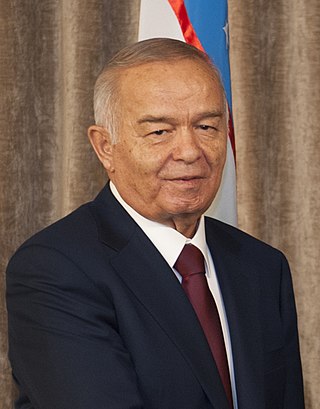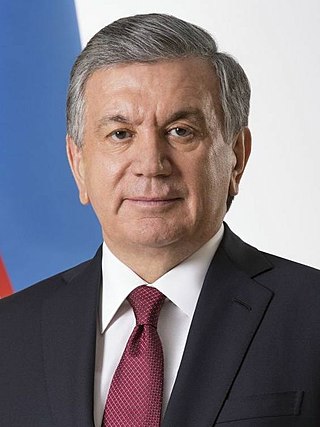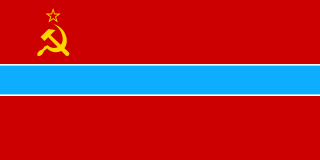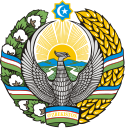
Uzbekistan, officially the Republic of Uzbekistan, is a country located in Central Asia. It is surrounded by five countries: Kazakhstan to the north; Kyrgyzstan to the northeast; Tajikistan to the southeast; Afghanistan to the south; and Turkmenistan to the southwest. Uzbekistan is part of the Turkic world, as well as a member of the Organization of Turkic States. Uzbek is the majority language, while Russian is widely spoken and understood. Islam is the predominant religion, most Uzbeks being Sunni Muslims.

Uzbekistan is a landlocked country in Central Asia. It is itself surrounded by five landlocked countries: Kazakhstan to the north; Kyrgyzstan to the northeast; Tajikistan to the southeast; Afghanistan to the south, Turkmenistan to the south-west. Its capital and largest city is Tashkent. Uzbekistan is part of the Turkic languages world, as well as a member of the Organization of Turkic States. While the Uzbek language is the majority spoken language in Uzbekistan, Russian is widely used as an inter-ethnic tongue and in government. Islam is the majority religion in Uzbekistan, most Uzbeks being non-denominational Muslims. In ancient times it largely overlapped with the region known as Sogdia, and also with Bactria.

The Republic of Uzbekistan is a presidential constitutional republic, whereby the President of Uzbekistan is head of state. Executive power is exercised by the government and by the Prime Minister of Uzbekistan.

Islam Abduganiyevich Karimov was an Uzbek politician who led Uzbekistan and its predecessor state, the Uzbek Soviet Socialist Republic, from 1989 until his death in 2016. He was the last First Secretary of the Communist Party of Uzbekistan from 1989 to 1991, when the party was reconstituted as the People's Democratic Party of Uzbekistan (O‘zXDP); he led the O‘zXDP until 1996. He was the President of the Uzbek SSR from 24 March 1990 until he declared the independence of Uzbekistan on 1 September 1991.

Shavkat Miromonovich Mirziyoyev is an Uzbek politician who has served as President of Uzbekistan and Supreme Commander-in-Chief of the Armed Forces of Uzbekistan since 14 December 2016. Previously, Mirziyoyev led the government as a Prime Minister of Uzbekistan from 2003 to 2016.

The Uzbek Soviet Socialist Republic, also known as Soviet Uzbekistan, the Uzbek SSR, UzSSR, or simply Uzbekistan and rarely Uzbekia, was a union republic of the Soviet Union. It was governed by the Uzbek branch of the Soviet Communist Party, the legal political party, from 1925 until 1990. From 1990 to 1991, it was a sovereign part of the Soviet Union with its own legislation.

The Parliament of the Republic of Kazakhstan is the bicameral legislature of Kazakhstan. The lower house is the Mäjilis, with 98 seats which are elected to five-year terms. The upper house is the Senate, which has 50 members.

The Erk Democratic Party is a political party in Uzbekistan formed in 1990 as a pro-independent party in the Soviet Union. It was the first registered political party in the history of Uzbekistan. Its charter was registered at the Ministry of Justice, Certificate of registration dated 3 September 1991, No. 039, which was signed by the minister of justice before the adoption of the law of Uzbekistan on political parties. The principal goals of activities, as written in the certificate on registration, are "the foundation of the independent democratic republic for Uzbekistan." Since 1993, its headquarters have been in Istanbul, Turkey.

Presidential elections were held in Uzbekistan on 23 December 2007. Incumbent president Islam Karimov was re-elected with 91% of the vote.

The People's Democratic Party of Uzbekistan is a political party in Uzbekistan. It was founded in 1991 as the legal successor of the Communist Party of Uzbekistan. Under its founder Islam Karimov, it oversaw the dissolution of the Uzbek Soviet Socialist Republic and the establishment of the Republic of Uzbekistan. After Karimov resigned from the party in 1996 and later formed the Uzbekistan Liberal Democratic Party, it lost its ruling party status.

Presidential elections were held in Uzbekistan on 9 January 2000. The result was a victory for incumbent Islam Karimov, who received 96% of the vote. Turnout was reported to be 95%.

Parliamentary elections were held in Uzbekistan on 27 December 2009 and 10 January 2010 to elect the 150 members of the Legislative Chamber of Uzbekistan, the lower house of the Oliy Majlis. Of these, 135 were directly elected from single member constituencies using the two-round system, while 15 seats were reserved for the country's Ecological Movement. Provincial and district councils were elected at the same time. Polls opened at 06:00 and closed at 20:00.

The Ecological Party of Uzbekistan is a political party and environmental movement in Uzbekistan. It was founded on 2 August 2008 as the Ecological Movement of Uzbekistan, and re-inaugurated as a formal political party in January 2019 in advance of expected electoral reforms.
Direct presidential elections were held for the first time in Uzbekistan on 29 December 1991. Their result was a victory for Islam Karimov of the People's Democratic Party of Uzbekistan, who won with 87% of the vote. Voter turnout was reported to be 94%. The elections were held alongside an independence referendum.

Parliamentary elections were held in Uzbekistan on 25 December 1994, with a second round held in 39 constituencies on 8 January 1995 and seven constituencies on 22 January. The election was contested by 634 candidates, 250 nominated by local councils, 243 members of the People's Democratic Party of Uzbekistan, and 141 Progress Party of the Fatherland members. The majority of seats were won by local council nominees, whilst the People's Democratic Party emerged as the largest party.

Snap presidential elections were held in Uzbekistan on 4 December 2016, following the death of incumbent President Islam Karimov on 2 September. The constitution mandated that the election be held within three months of Karimov's death. Interim President Shavkat Mirziyoyev won the elections with 90% of the vote. The elections were described by the Economist as a sham, and by the Organization for Security and Co-operation in Europe as lacking "a genuine choice".

Parliamentary elections were held in Uzbekistan on 22 December 2019, with a second round in 25 of the 150 constituencies on 5 January 2020. They were the first elections to be held after the death of Islam Karimov in 2016. The ruling Uzbekistan Liberal Democratic Party remained the largest party in the Legislative Chamber, winning 53 of the 150 seats. All five parties contesting the elections were regarded as loyal to President Shavkat Mirziyoyev.

Presidential elections were held in Uzbekistan on 24 October 2021. This was the sixth presidential election held since independence. Incumbent President Shavkat Mirziyoyev won a second term with a majority 80.1% of the vote, although faring the lowest performance for an incumbent in terms of vote share since 1991. Maqsuda Vorisova from the People's Democratic Party of Uzbekistan (XDP) was the runner-up and Alisher Qodirov from the Uzbekistan National Revival Democratic Party came third, which marked the first time that more than two candidates had officially received more than 5% of the vote.
Individuals and events related to Uzbekistan in 2021.
The Progress of the Fatherland Party was a centre-right political party in Uzbekistan between 1992 and 2000. It served as the "constructive opposition" against the ruling People's Democratic Party of Uzbekistan.












